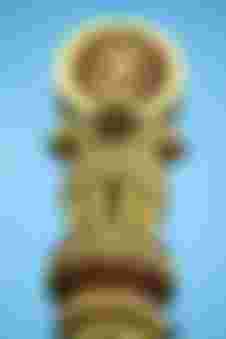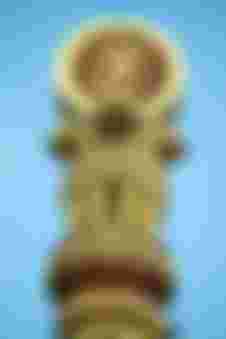Ashoka, the grandson of the great Chandragupta Maurya and the son of Bhimsa, was the third emperor of the Maurya Empire. The word Ashoka means - without grief or sorrow. According to the Asokavadana, he was given this name by his mother as he relieved his mother's grief at birth.

After the death of Bindusara in 272 BC, the dispute over the right to the throne began among the sons. Bindusara's eldest son was named Sudhin and his second son was Ashoka. Sudhin was an arrogant luxury. Ashoka was heartless and cruel. He killed his brother and took the throne. Ashoka's next brother's name was Tishya.
Ashoka felt that he had killed his eldest brother and ascended the throne, much to the annoyance of many in the kingdom. If Tishya is killed on him, the people can declare rebellion. So he was sent to Takshila by the ruler there.
The name of the youngest brother was Bitashok. From his childhood, Bitashok was indifferent to the pleasures of Raj Aishwarya. The quarrel between the brothers over this right to the throne, the quarrel made him even more depressed. He left home in the hope of liberation. The Buddhist monk took initiation from Giridatta and became a monk with the Buddhists.

Ashoka ascended the throne and established his rights in the first few years. He killed those who refused to obey him. People used to call him Chandashoka for his atrocities.
Shortly after the battle of Kalinga, he was initiated into Buddhism. His heart was filled with the love and compassion of Buddhism. Chandashoka Ashoka was transformed into Dharmashoka Ashoka.
Ashoka declared that there would be no more war, this time religion would be victorious. Brotherhood must conquer the other with love, compassion. He did not end his duty just by giving instructions. For so long Rajsukh had abandoned the luxury he had been acquainted with and led a simple holy life.
He sent envoys to the kings of all the neighboring countries, declaring that he wanted to be in friendship with them. Let everyone rule their kingdom without fear. Even Emperor Ashoka forbade his successors to fight for the conquest of the country. He used to advise them to conquer people not through arms, but through love, compassion and kindness. Emperor Ashoka called this victory the victory of religion.

Ashoka was a believer in Buddhism. It was mainly through his efforts that Buddhism spread to eastern India. However, he not only sent preachers to different parts of the state to preach the religion, but also engraved various exhortations on the pillars of the Pillar Mountains in different parts of the country so that the people could observe the commandments. The Ashtamarga of the Buddhists has no special resemblance to the advice given by Ashoka in these injunctions.
Many paths were built under the direction of Ashoka. Bot and mango trees were mainly planted on both sides of the road. So that people can walk in the shadows. Can eat tree fruit during hunger. Wells were dug along the path every eight crores.
He had a deep affection for not only humans but also animals. He banned animal slaughter / hunting in all states. He was the first in the history of human civilization to establish a hospital for animals. Such an example of compassion for all living beings is rare in the world.
Although Ashoka was a Buddhist, he had no animosity towards any other religion. In an inscription, he writes, praise for one's own religion should not condemn the religion of others. Listening to each other's beliefs, one should accept its essence, the original truth.

Emperor Ashoka spent all his life on the welfare of the people and their spiritual advancement. Yet he had hesitation in his heart. Is he doing his duty as an emperor? One day he asked the Guru, Gurudev, what is the greatest gift?
The Buddhist monk replied, The greatest gift is charity. Only in the sacred light of religion can the heart of man be enlightened. You give that religion.
Ashoka humbly accepted the guru's order. Inspired by him, the glorious message of Buddhism spread to different parts of India. But where no light of Buddhism has reached, who will go to the Deccan, to distant Sinhala?
Ashoka sent people to spread Buddhism not only in Sinhala but also in many other countries outside India. He wanted his message of non-violence and love to inspire all people irrespective of Hindu Buddhism.
But the Brahmins of that time did not accept his Buddhist devotion well. In addition, none of his queens were respectful of Buddhism. He started conspiring secretly with the Brahmins. At first Ashoka knew nothing. But some faithful servants told him all the news.
Ashoka was shocked. The ideal he has preached to millions of people for so long is being opposed by his wife today. Saddened, he left the kingdom and took refuge in a Buddhist monastery.
One day he was the emperor of the whole of India, today he is empty. Realizing that the world has run out of his needs, this time he has to say goodbye. Within a few days, King Mahamati Ashoka passed away with a broken heart.

Let's find out some more interesting facts about Ashoka -
Emperor Ashoka was the third emperor of Magadha. He had another name - Priyadarshi.
🌠Emperor Ashoka is considered to be the best king of India.
No such detailed account of Emperor Ashoka's personal life has gone unnoticed. So Ashoka's personal life remains in the dark. According to various inscriptions, his chief buffaloes were Sanghamitra, Karubaki, Charubaki, Devi, Padmavati and Tisarakshita. According to the inscription, his sons were - Mahendra, Tibar, Kunal and Janak. However, this information is not sufficient evidence and may not be one hundred percent true.
After Ashoka's death, his two sons Dasaratha and recently his kingdom were divided.
About forty inscriptions of Ashoka have been found from different places. They also prove that he did not kill his brothers.
🌠Ashoka conquered Kalinga eight years after becoming king. Ashoka's battle of Kalinga killed 1 lakh people and injured 1.5 lakh. Emperor Ashoka Ranachandi became the cause of huge losses in the war. The epidemic started all around. Famine started, poverty started.
Emperor Ashoka sent his daughter Sanghamitra and son Mahendra to Singhal for preaching
During his time, about 84,000 Buddhist stupas were erected all over the country. However, the lack of reform has largely ruined it.

I hope you have learned a lot.
If you like it, go with upvote. Stay well





